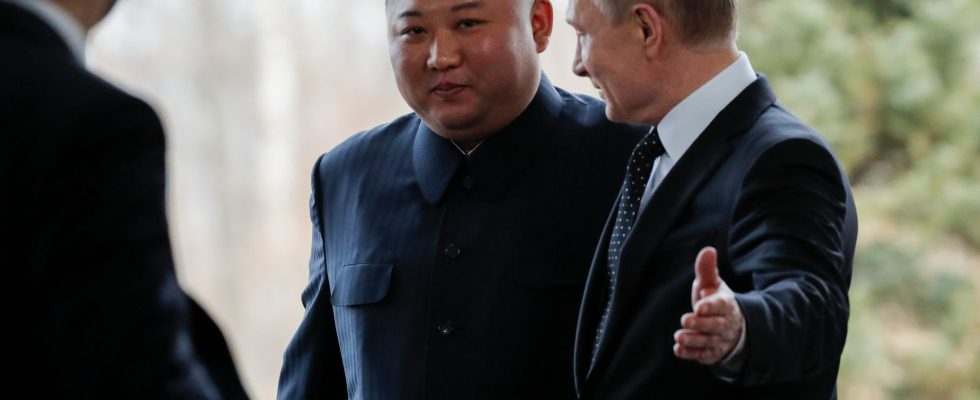Korea’s National Liberation Day, Tuesday, August 15, was marked by a Russian gift. In a congratulatory message to North Korean leader Kim Jong-un published by the Kremlin, Vladimir Putin called for a consolidation of relations between Moscow and Pyongyang. A call to “strengthen bilateral cooperation in all areas for the good of our peoples”.
A few hours later, it was the turn of North Korean power to repeat this same wish “in the field of security and defense”, according to Russian press agencies. Two friendly declarations which are part of a broader approach of attempted rapprochement between Russia and North Korea, while Moscow has its allies, in the midst of the war in Ukraine.
Glorifying a common past in the face of Western allies
This day celebrating the victory of the Allies against the Japanese occupier in August 1945, the Russian leader therefore took the opportunity to celebrate this “symbol of the courage and heroism of the soldiers of the Red Army and the Korean patriots who fought together “, quotes AFP. A period when “traditions of friendship and cooperation were born to become a solid basis for the development of good neighborly relations between the Russian Federation and North Korea”, underlined Vladimir Putin. Russia indeed shares a short border of 17.5 kilometers with the Korean dictatorship.
Beyond playing the card of fraternal ties, Vladimir Putin also recalled the common enemy which had united the two armies in 1945, “Japanese colonialism”. A reference that seems more modern than historical, recalling the dark hours of this ally of the United States and South Korea when they opposed Russia at the geopolitical level.
A new sign of rapprochement between the two countries
And for good reason: the other objective of this enhanced cooperation would be, according to Vladimir Putin, “in the interest of strengthening stability and security on the Korean peninsula and in the North-East Asian region in general”.
Russia has recently increased its declarations to this effect, a sign that relations between the two countries are warming up. At the end of July, Russian Defense Minister Sergei Shoigu described North Korea as an “important partner” during a meeting in Pyongyang with his North Korean counterpart. The Russian president thus seems to want to continue to get closer to North Korea to keep the country in the lap of his influence, in opposition to the Japan-South Korea-United States trio in Southeast Asia.
Vladimir Putin’s statement also comes a few days before a summit on Friday in Washington between the leaders of these three countries, whose stated objective is to strengthen their security cooperation, in the face of a North Korea which called on Monday to intensify its production of nuclear weapons.
The Western bloc is also not fooled by the game of Russian seduction: in February, the United States accused North Korea of delivering rockets and artillery shells to the private Russian militia Wagner, which Pyongyang denies. For US Secretary of State Antony Blinken, the Russian Defense Minister’s visit to the North Korean capital at the end of July was an opportunity to ensure these arms deliveries, necessary for the continuation of the invasion of Ukraine.
Russia counts its allies in parallel
This new Russian declaration in support of North Korea also takes place in a context where Moscow has its allies, a year and a half after the start of its invasion of Ukraine. While this unilateral war has accentuated his isolation on the international scene, Vladimir Putin brought together this Tuesday, August 15 the representatives of some twenty countries to its 11th Moscow International Security Conference.
According to the Russian press agency CASS, Belarus, China, Iran, South Africa, Burma, Pakistan and a former Austrian Foreign Minister were notably present for the occasion. An event organized by the Ministry of Defense, and whose central theme is “the establishment of a multipolar world order”. A summit meeting which nevertheless seems less attractive than the previous year: whether for agenda problems or to distance oneself from Russia, about fifteen countries present in 2022 did not return to Moscow this year. Pyongyang, for its part, called the conflict in Ukraine a “proxy war” by the United States aimed at destroying Russia and condemned Western military aid to Kiev, echoing Russian rhetoric.
